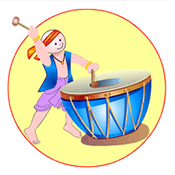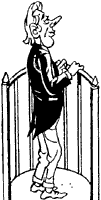
Dimdima
Online Children's Magazine from India

Dimdima
Online Children's Magazine from India
| Europeans Take To The Street! |
|
|
 Writes Henry Cotton : "Lord Ripon was harassed and hampered by the bigotry and race feeling of his own fellow countrymen. He was paralysed by want of support".
Writes Henry Cotton : "Lord Ripon was harassed and hampered by the bigotry and race feeling of his own fellow countrymen. He was paralysed by want of support".
Ultimately, Lord Ripon was compelled to settle for a watered-down version of the Ilbert Bill. The modification allowed a white person facing trial to have a bench of jury, half of which was composed of whites.
Surendranath Banerji in Bengal, Pherozeshah Mehta, Badruddin Tyabji and Kashinath Telang in Bombay organised their own campaign in support of the Ilbert Bill. But leaders in other parts of the country did not take any interest in the matter and the campaign fizzled out. A.C. Mazumdar, an eminent political leader noted : "The Ilbert Bill agitation thus went a great way towards impressing Indians, that in the political world, success did not depend so much upon men as on organised efforts and so paved the way to united and concerted action".
The European-led agitation against the Ilbert Bill also served as an eye-opener to westernised Indians who now realised that the whites would never accept them as equals even though they dressed and talked and behaved like them.
"The Anglo-Indian agitation against Lord Ripon's government, the protests which asserted that 'the only people who have any right to India are the British', the whole attitude of Englishmen in regard to Indian interests", concludes Henry Cotton, "have only succeeded in advancing the cause of Indian unity…."
Dimdima is the Sanskrit word for ‘drumbeat’. In olden days, victory in battle was heralded by the beat of drums or any important news to be conveyed to the people used to be accompanied with drumbeats.
Bharatiya Vidya Bhavan
K. M Munshi Marg,
Chowpatty, Mumbai - 400 007
email : editor@dimdima.com
Bharatiya Vidya Bhavan
505, Sane Guruji Marg,
Tardeo, Mumbai - 400 034
email : promo@dimdima.com
Dimdima.com, the Children's Website of Bharatiya Vidya Bhavan launched in 2000 and came out with a Printed version of Dimdima Magazine in 2004. At present the Printed Version have more than 35,000 subscribers from India and Abroad.